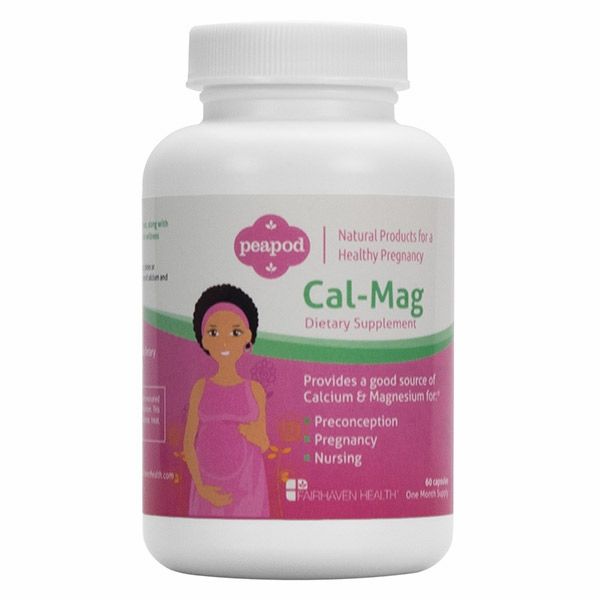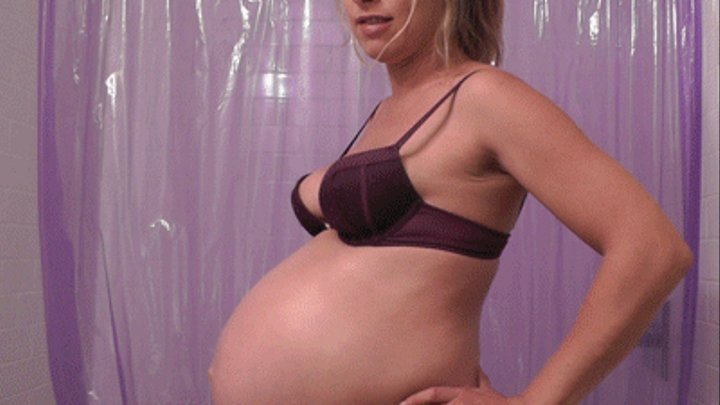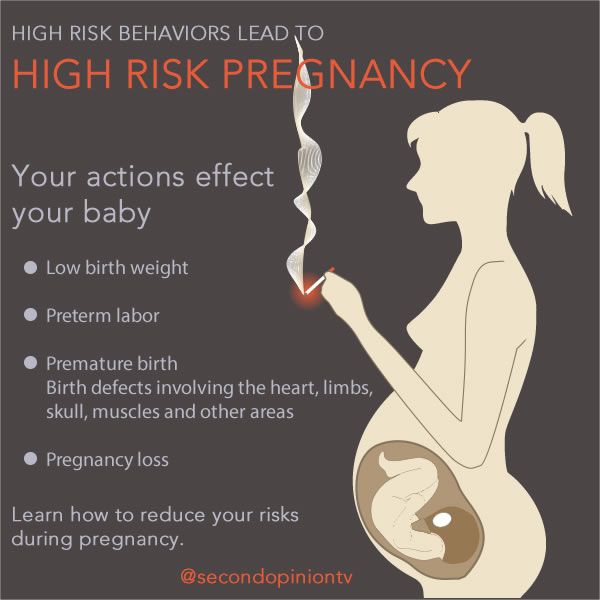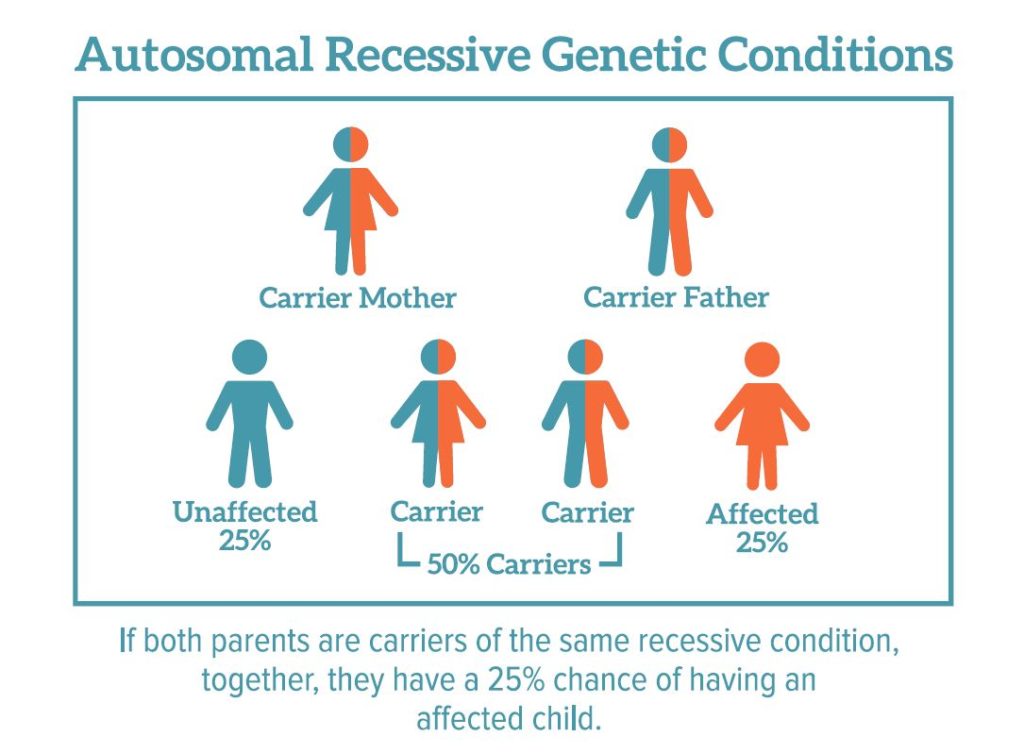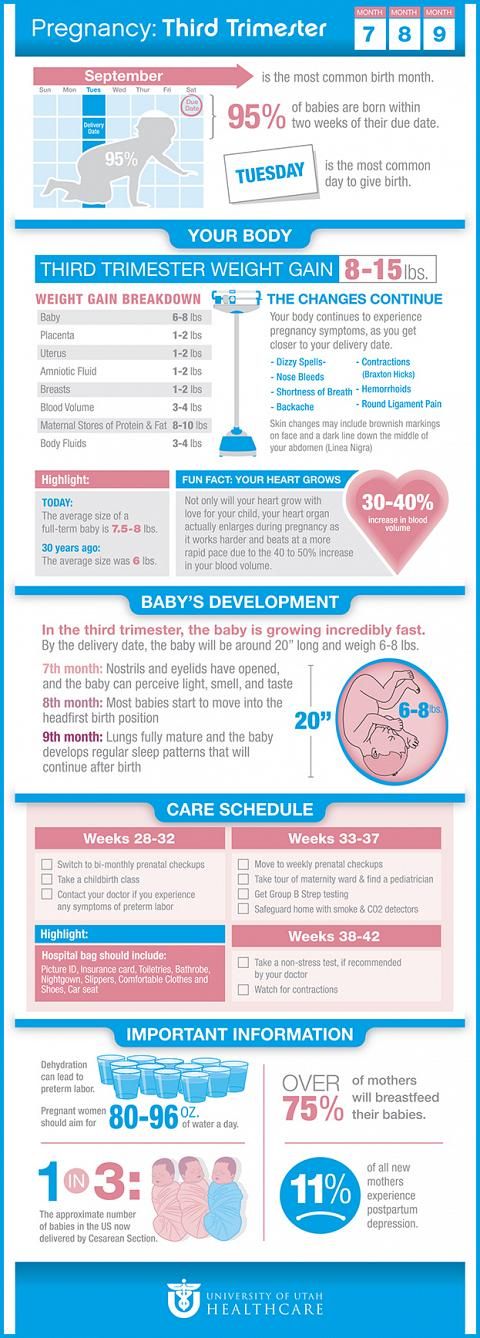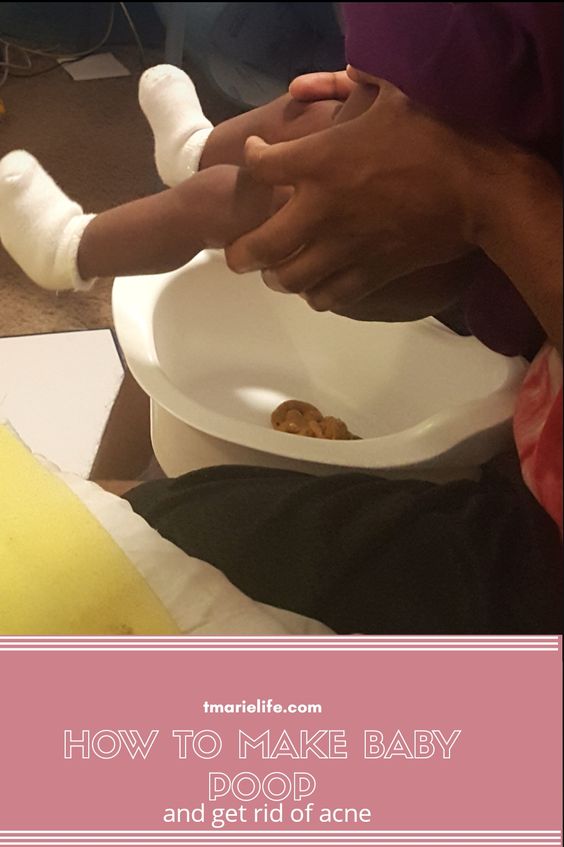Magnesium for leg cramps pregnancy
Can Magnesium Reduce Cramps During Pregnancy
HOW TO AVOID LEG CRAMPS DURING PREGNANCY
Some simple processes that have been shown to reduce leg cramps during Pregnancy are:
- Drink plenty of fluids throughout the day and evening
- Daily soak in a warm bath with Epsom salts
- Stretch your legs/calves before bed by squatting down to the floor (hold on for safety)
- Wear compression stockings (tighter at the foot and looser near the knee)
- Stay off the feet during the day as much as possible and
- Massage the affected muscle and apply local heat
- Seek to remedy any mineral imbalances in your body
WHAT IS MUSCLE CRAMP?
Cramps are often painful and sudden contractions of your muscles. The most common places for cramping during pregnancy are your calf and the inner thigh.
WHAT CAUSES CRAMPS DURING PREGNANCY?
It is thought that as your fetus grows, the extra demand for essential nutrients can diminish your normal levels. Evidence points to magnesium (Mg) deficiency as a key driver of muscle cramps.
In addition to the possibility of a magnesium deficiency another cause could be due to your muscle fatigue resulting from carrying extra weight in the later stages of pregnancy.
WHY DO YOUR MAGNESIUM LEVELS DROP DURING PREGNANCY?
As your baby grows the demands on your body increase. Also your metabolism changes and your kidney excretes more magnesium. As your pregnancy progresses your body may not obtain enough magnesium through diet, so your magnesium can become depleted and not match your needs
Dietary sources of magnesium include whole grain cereals, green leafy vegetables, legumes, soybeans, nuts, dried fruit, animal protein and seafood. Studies have shown that supplemental magnesium can have benefits.
CAN MAGNESIUM DEFICIENCY BE DIAGNOSED?
The symptoms of magnesium deficiency can be evident in calf cramps and muscle tension.
Magnesium is found mostly in other tissues such as your muscle, soft tissues and bones.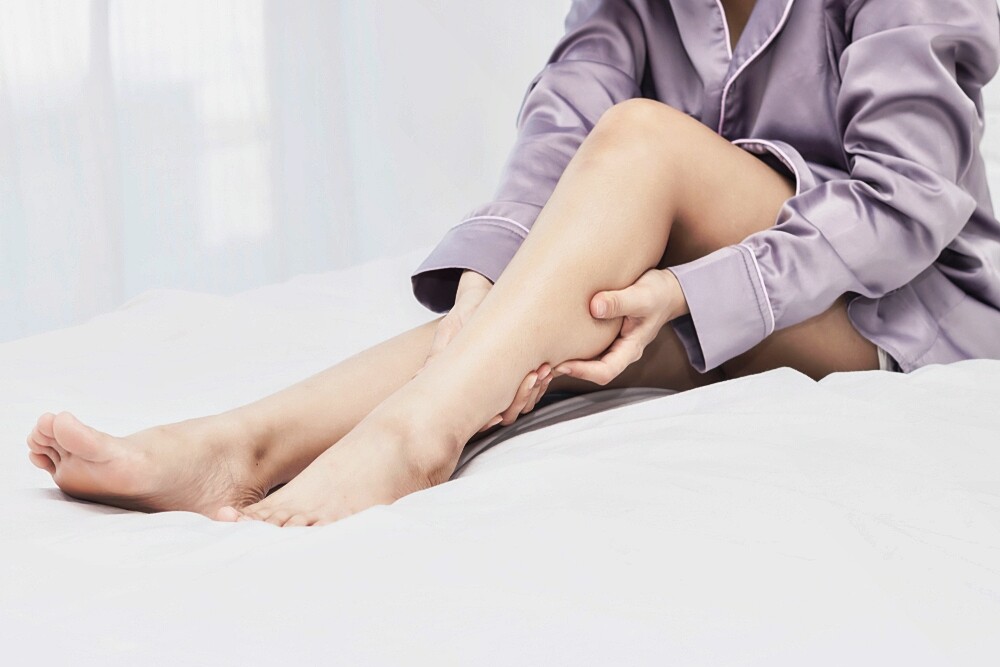 A small amount is in your blood so using blood tests to detect your magnesium levels is difficult.
A small amount is in your blood so using blood tests to detect your magnesium levels is difficult.
HOW DOES MAGNESIUM HELP REDUCE CRAMPS IN PREGNANCY?
Magnesium is one of the most common minerals in your body. It is essential to the function of hundreds of your enzymes and plays an important role in your metabolism, hormonal reactions and muscle movement.
As a deficiency of magnesium can affect a key part of your muscle relaxation process, by providing sufficient amounts of magnesium you will help your body regulate muscle contractions and avoid cramping
WHAT ARE THE SIDE EFFECTS OF MAGNESIUM SUPPLEMENTS?
Magnesium is well tolerated and safe in most cases. Some side effects may include diarrhea and nausea, which can be avoided by building up the dose gradually.
Magnesium is available in oral supplements that include tablets and powders. It can also be absorbed via the skin and some of the other products available are creams and a bath soak salts.
WHICH MAGNESIUM SUPPLEMENTS SHOULD I CONSIDER?
Different forms of magnesium can influence its absorption. The best bioavailability comes from a form of magnesium such as Magnesium aspartate or bisglycinate.
- Salts - Inexpensive salts of magnesium and include Magnesium oxide or citrate
- Tablets - Blackmore MagMin - use as directed 3-6 tablets with meals or as directed by your doctor.
- Magnesium Powders - Ethical Nutrients - use as directed 1 scoop (8.7g) in 200 ml of water twice daily
YOUR NEXT STEP
If you are experiencing any problems with your pregnancy or are concerned about cramping or other pain contact Dr Gailani who will offer advice.
For patients suffering from excessive pain or other anomalies contact your general practitioner or in case of an emergency an ambulance.
Otherwise if not already a patient possibly obtain a referral to see Dr Gailani at http://www. omargailani.com.au/contact/
omargailani.com.au/contact/
Magnesium supplements – can it help with cramps in pregnancy?
Magnesium supplementation in the reduction of muscle cramps in pregnancy – is there evidence supporting its use? Dosages recommended. What supplement brands to use?
Up to half of pregnant women in the second and third trimester complain of leg cramps particularly at night. There have been various mechanisms postulated for this effect, some of which are due to deficiencies caused by the growing fetus: low potassium, calcium and magnesium (Mg) levels. By far the strongest evidence involving pregnancy related cramps is pointing towards the link with Mg deficiency. This article summarizes the current evidence available for treating muscle cramps in pregnancy with Mg supplementation. (2)
What is the role of Magnesium?
Mg is the forth most abundant essential mineral in the body. It is involved in activation of over 300 different enzymes in the body and is an important player in metabolism, hormonal reactions and muscle contraction.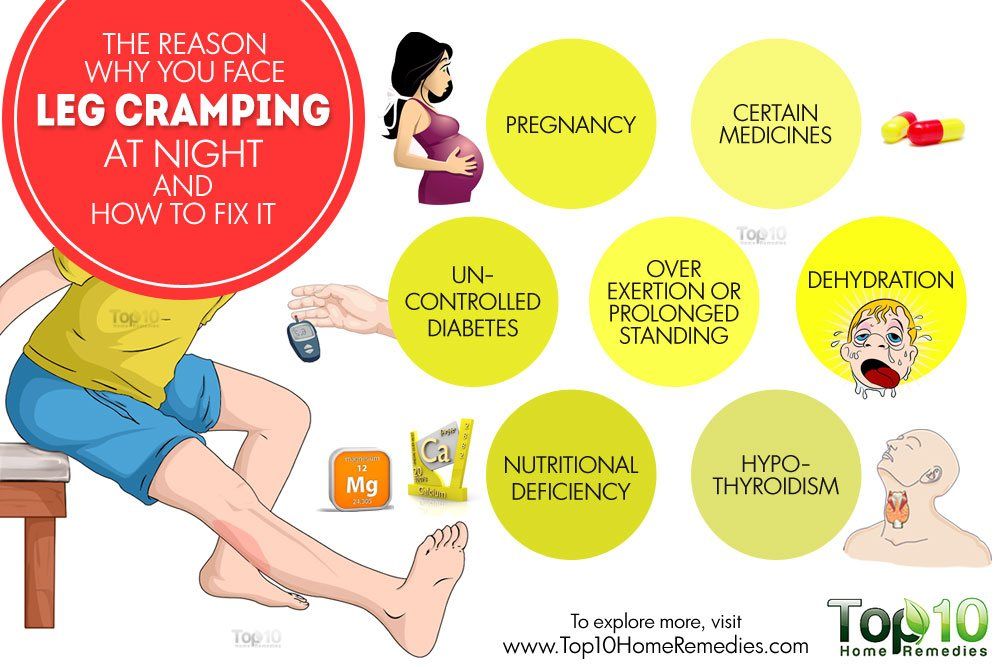 (3)
(3)
More than half of the Mg in the body is distributed between muscles and soft tissues. This means that the other 50% of Mg is stored in the bones and very small amount will be in the blood. For this reason Mg deficiency can be difficult to diagnose with a blood test. The test result will not reflect of what levels are in the tissues. (3)
In skeletal muscle, Mg plays a role in relaxation. So when there is a deficiency the muscle will not be able to relax causing a cramp. (1)
What is a muscle cramp?
Cramps are an involuntary, sudden, uncomfortable squeezing or contraction of a muscle (1).
The two most common places for pregnancy cramping are the calf and the inner thigh (adductor muscle). In addition, to Mg
deficiency, the latter, is most likely due to the muscle fatigue from carrying around the extra weight around the pelvis.
How does Mg help with cramps in pregnancy?
Due to the growing fetus, the Mg requirement increases during the pregnancy.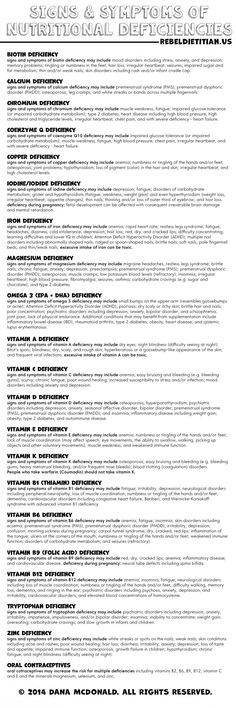 Additionally, there are changes in the metabolism of the mother, and Mg excretion via the kidney goes up. Towards the second half of pregnancy Mg requirement is difficult to obtain from food alone. Typical symptoms of Mg deficiency might develop as pregnancy progresses: eg. Calf cramps, muscle tension.
Additionally, there are changes in the metabolism of the mother, and Mg excretion via the kidney goes up. Towards the second half of pregnancy Mg requirement is difficult to obtain from food alone. Typical symptoms of Mg deficiency might develop as pregnancy progresses: eg. Calf cramps, muscle tension.
Hence, there are extensive studies showing that therapeutic benefit of Mg in pregnancy related cramps. (3)
Given that Mg is well tolerated it can be safely used in most cases. Some of the side effects may include diarrhea and nausea, which can be avoided by building up the dose gradually.
Magnesium is available in oral supplements that include tablets and powders. It also can be absorbed via the skin and some of the other products available are creams and a bath soak salts.
Which form of Mg should I use?
Different forms of Mg influence its absorption. Inexpensive salts of Mg include Mg oxide. Another is Mg citrate, which is better absorbed then the oxide salt (4).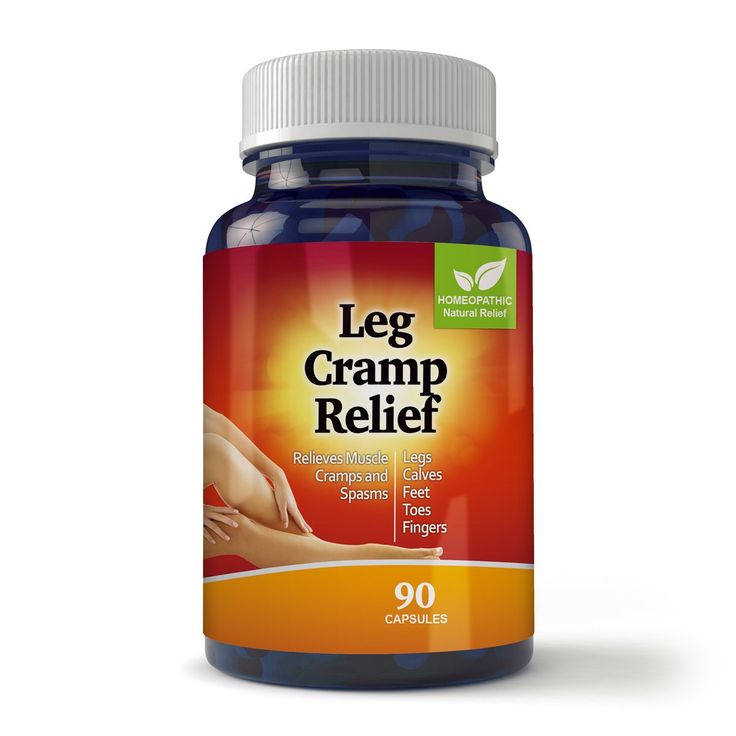 The best bioavailability comes from the chelated form of Mg such as Magnesium aspartate or bisglycinate.
The best bioavailability comes from the chelated form of Mg such as Magnesium aspartate or bisglycinate.
What brand of supplements do I take?
Recommended dosages to take for cramps in pregnancy vary.
Here is what we recommend:
Dosage recommended: Take 3-6 tablets with meals or as directed by your doctor.
A more convenient dose may be in a powder form. Our pick:
Dosage recommended: Take 1 scoop (8.7g) in 200ml of water twice daily.
Another product that we would strongly recommend to use in conjunction with supplements is Epsom salts:
Directions: Dissolve 375g in an average size bath of warm water.
Are there other measures I can do?
Stretch the affected calf by flexing at the ankle so that your toes are pointed towards your head. Do not point your toes as this may aggravate your cramp.
If you get a cramp in your calf or the inner thigh try the following:
- Wear support hosiery, such as compression stocking that are graduated (meaning that they are tighter at the foot and looser near the knee).
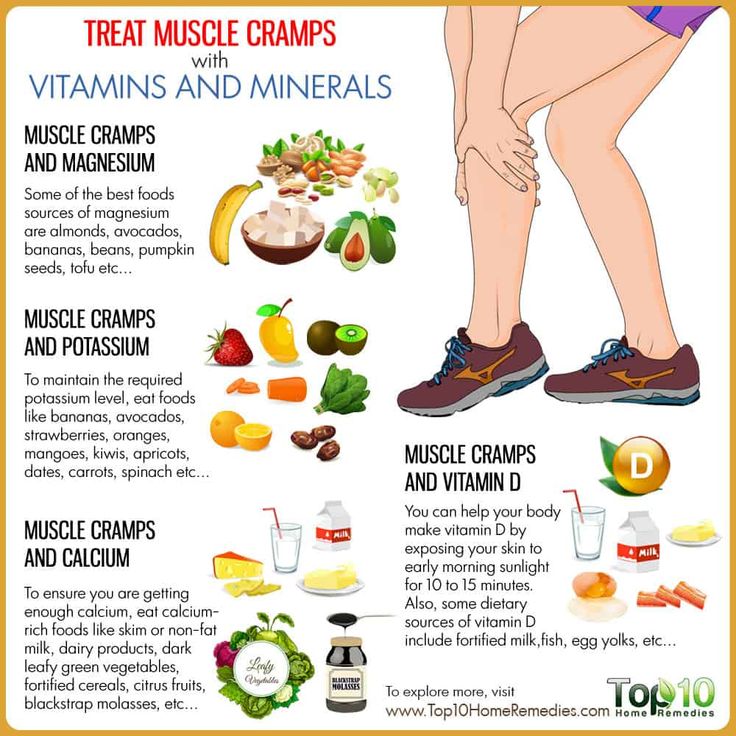
- Drink plenty of fluids throughout the day and evening.
- Massage the affected muscle.
- Apply local heat.
- While holding on, squat down to the floor.
- Daily soak in a warm bath with Epsom salts.
What foods contain Mg?
Dietary sources of magnesium include whole grain cereals, green leafy vegetables, legumes, soybeans, nuts, dried fruit, animal protein and seafood. (4)
Have you experienced cramps in pregnancy in the past or do you have it now? What treatment did you find the most useful?
References:
- Nguyen V. Magnesium supplementation in the reduction of muscle cramps: A systematic literature review. The Australian Journal of Pharmacy. Nov 2013. P80-83.
- Young G, Jewell D. Interventions for leg cramp in pregnancy. Cochraine Database Systematic Review CD000121 2002.
- Dahle L; Berg G; Hammer M, Hurtig M; Larsson L. The effect of oral magnesium substitution on pregnancy-induced leg cramps.
 American Journal of Obstetrics and Gynecology 1995 Jul; 173(1) 175-80.
American Journal of Obstetrics and Gynecology 1995 Jul; 173(1) 175-80.
Wu J; Carter A. Magnesium: the forgotten electrolyte. Australian Prescriber. Vol 30: 4. Aug 2007. P102-105.
- Linberg JS; Zobitz MM; Pintdexter JR; Pak CY. Magnesium bioavailability from magnesium citrate and magnesium oxide. J Am Coll Nutri. 1990 Feb; 9 (1): 48-55.
- Sebo P, Cerutti B, Haller DM. Effect of magnesium therapy on nocturnal leg cramps: a systematic review of randomized controlled trials with meta-analysis using simulations. Fam Pract 2014; 31:7-19.
Article from: www.fertilitypharmacy.com.au
Interventions for leg cramps during pregnancy
What is the problem?
Leg cramps manifest themselves as sudden, intense involuntary contractions of the leg muscles. This is a common problem during pregnancy, especially in the third trimester. They are painful and can interfere with daily activities, disrupt sleep, and reduce quality of life.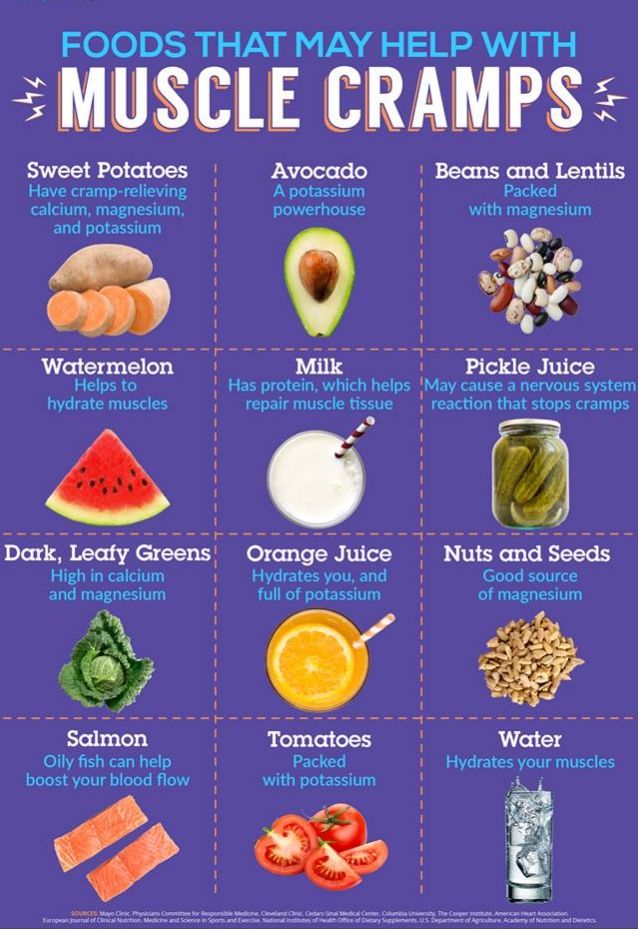 Various types of interventions are used to treat leg cramps during pregnancy, including medications, electrolytes (magnesium, calcium, sodium) and vitamins, as well as non-drug therapies such as muscle stretching. nine0005
Various types of interventions are used to treat leg cramps during pregnancy, including medications, electrolytes (magnesium, calcium, sodium) and vitamins, as well as non-drug therapies such as muscle stretching. nine0005
Why is this important?
The aim of this review was to find out which treatment for leg cramps during pregnancy is effective and safe.
What evidence did we find?
In September 2019, we searched for evidence and identified eight randomized controlled trials in 576 women 14 to 36 weeks pregnant comparing magnesium, calcium, calcium with vitamin D or B vitamins versus placebo or no treatment, and compared vitamin C with calcium. All drugs were given as tablets to chew or swallow. nine0005
Magnesium supplements may reduce the incidence of leg cramps in women compared with placebo or no treatment, although studies have not been consistent.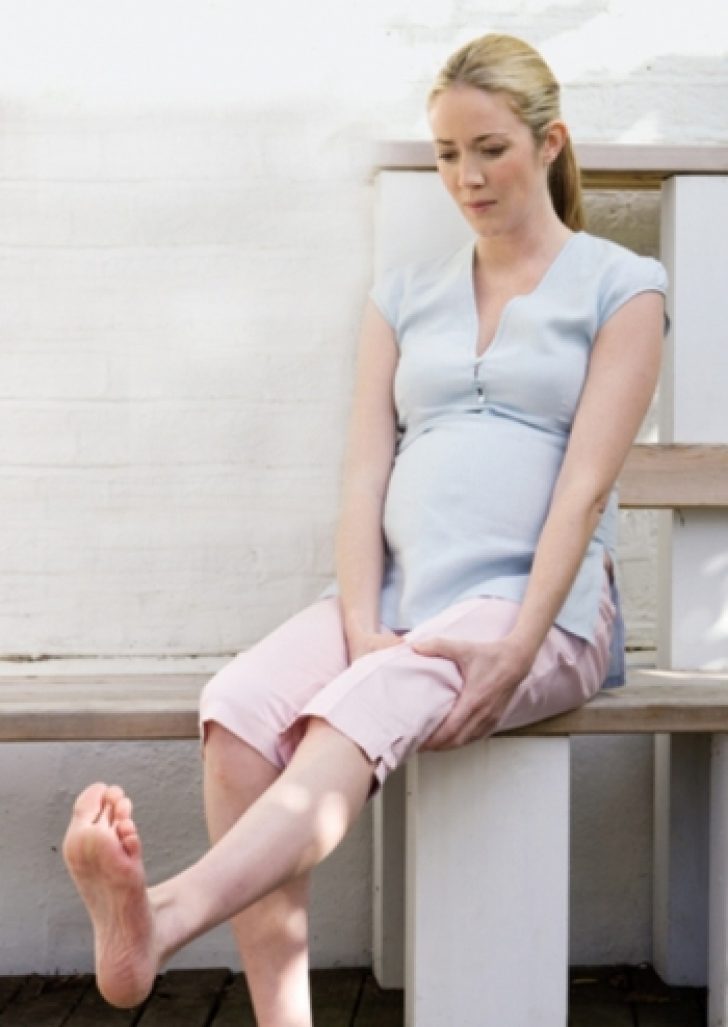 Different studies have assessed the effect of magnesium supplementation differently. Some studies have shown magnesium to help reduce the incidence of leg cramps, while others have shown little or no effect. Data on the effect of magnesium on pain reduction was also inconclusive, with only one study showing a reduction in pain intensity, while others showed no difference. Differences in the occurrence of side effects such as nausea and diarrhea were negligible or non-existent. nine0005
Different studies have assessed the effect of magnesium supplementation differently. Some studies have shown magnesium to help reduce the incidence of leg cramps, while others have shown little or no effect. Data on the effect of magnesium on pain reduction was also inconclusive, with only one study showing a reduction in pain intensity, while others showed no difference. Differences in the occurrence of side effects such as nausea and diarrhea were negligible or non-existent. nine0005
Calcium did not always reduce the incidence of leg cramps in women after treatment compared to those who did not receive any treatment. It also found that the evidence was of very low quality, so we cannot be sure of the results.
More women who received B-vitamin supplements made a full recovery compared to those who received no treatment; however, these results were based on a small sample size and the study had design limitations. nine0005
Frequency of leg cramps did not differ between women receiving calcium and women receiving vitamin C.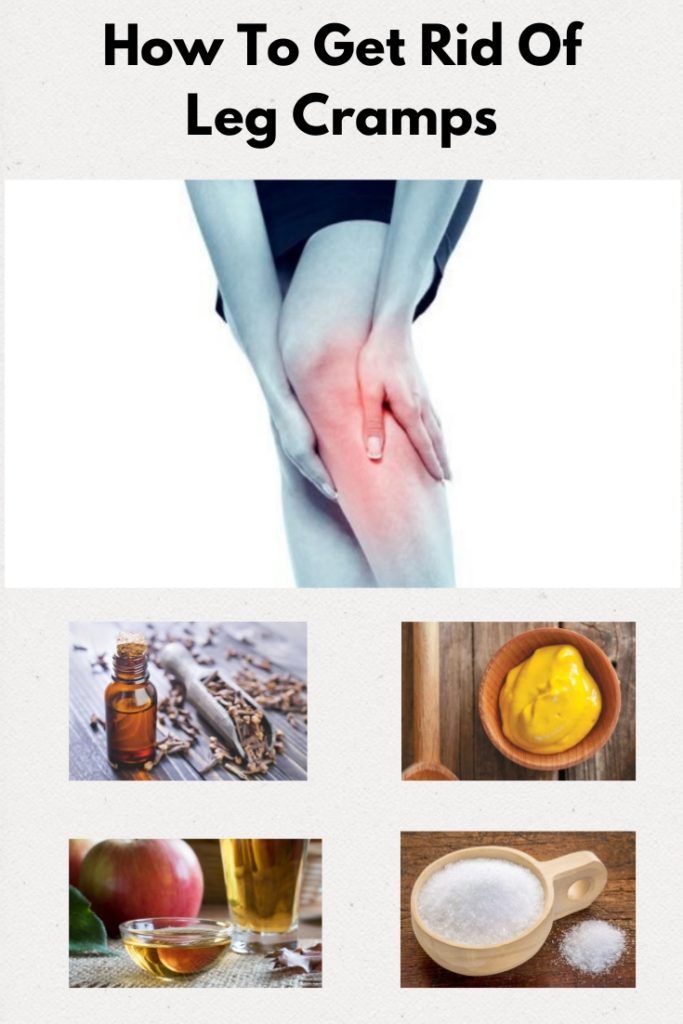 with placebo.
with placebo.
What does this mean?
The quality of the evidence was low to very low. This was mainly due to small study sample sizes and study design weaknesses. Four studies were well-conducted and presented their reports. The remaining four had flaws in their design: in several studies, women were not best assigned to different treatment groups, and in two studies, women knew whether they were receiving treatment or not. Adverse effects, such as the effect of treatment on complications of pregnancy, childbirth and child, were not reported. Several studies have focused primarily on serum calcium and magnesium levels. The frequency and intensity of seizures and duration of pain were not uniformly reported, and there was often no information on whether they were assessed during treatment, at the end of treatment, or after treatment was discontinued. nine0005
It is not clear from the evidence reviewed whether any oral interventions (magnesium, calcium, calcium with vitamin D, B vitamins, vitamin D, or vitamin C) are an effective and safe treatment for leg cramps during pregnancy.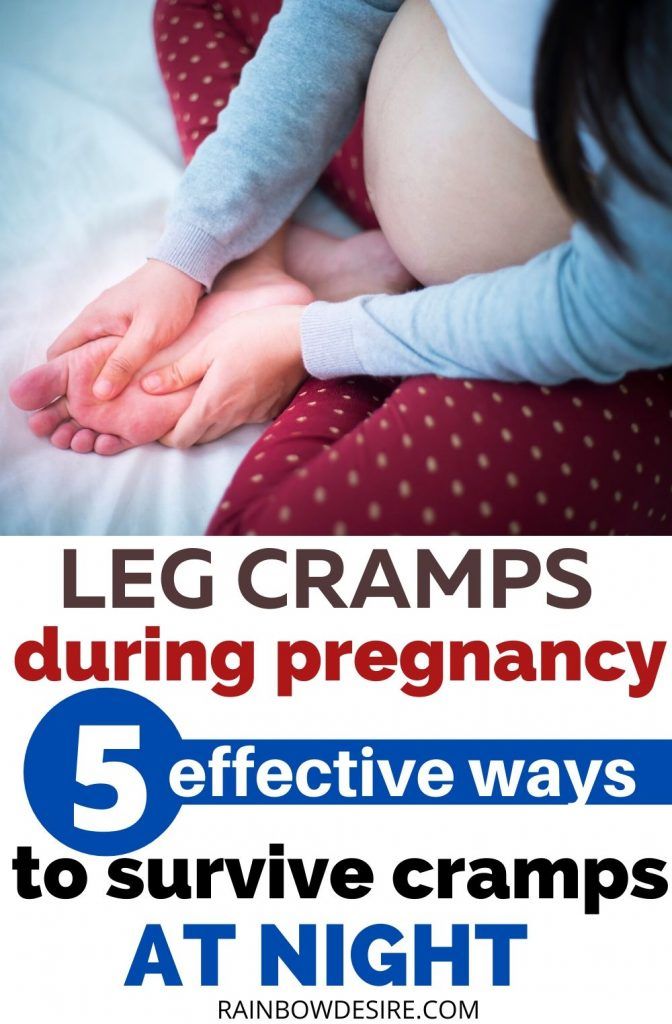 Supplements can have different effects depending on how women usually take them. None of the trials looked at forms of treatment such as muscle stretching, massage, relaxation, or heat therapy.
Supplements can have different effects depending on how women usually take them. None of the trials looked at forms of treatment such as muscle stretching, massage, relaxation, or heat therapy.
Translation notes:
Translation: Luzan Maria Alexandrovna. Editing: Yudina Ekaterina Viktorovna. Russian translation project coordination: Cochrane Russia - Cochrane Russia, Cochrane Geographic Group Associated to Cochrane Nordic. For questions related to this transfer, please contact us at: [email protected]
Reduces legs during pregnancy: what to do?
Pregnancy is a time of waiting and doubts. Probably, women never have so many questions. Why does it bring her legs together so often? What to do if you wake up with cramps at night? How to deal with this scourge and avoid bouts of pain in the legs? We are looking for answers to these and other questions. nine0005
What are seizures?
Legs cramps not only during pregnancy, from time to time every person faces unpleasant painful cramps. A cramp is a sudden, uncontrollable muscle contraction that a person cannot relax. This condition can be caused by neurological disorders (for example, seizures are characteristic of epilepsy), a number of diseases (such as diabetes mellitus, osteochondrosis, and others), and can also be associated with physiological conditions. After all, convulsions occur, for example, after a strong overload, dehydration, hypothermia, etc. Sometimes cramps cause severe sharp pain. Sometimes it seems that the legs are pulling. During pregnancy, this condition, unfortunately, is noted quite regularly. nine0005
A cramp is a sudden, uncontrollable muscle contraction that a person cannot relax. This condition can be caused by neurological disorders (for example, seizures are characteristic of epilepsy), a number of diseases (such as diabetes mellitus, osteochondrosis, and others), and can also be associated with physiological conditions. After all, convulsions occur, for example, after a strong overload, dehydration, hypothermia, etc. Sometimes cramps cause severe sharp pain. Sometimes it seems that the legs are pulling. During pregnancy, this condition, unfortunately, is noted quite regularly. nine0005
Why do pregnant women cramp their legs?
The mechanism of muscle contraction is quite complex, it involves different ions (charged particles): potassium, calcium, sodium and magnesium. If we are talking about a cramp, that is, a condition when we cannot relax a muscle, then magnesium ions play a leading role here. It is their lack that leads to the fact that women cramp their calves during pregnancy at night.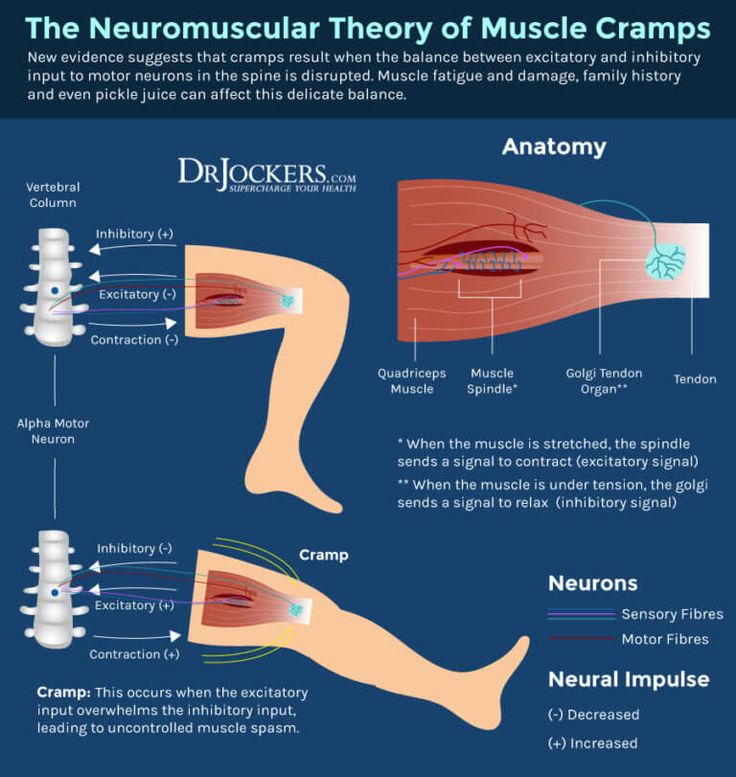
The lack of minerals in the body of the expectant mother is simply explained: such consequences are the restructuring of metabolism and functioning in the "double load" mode. In particular, the expectant mother needs one and a half times more magnesium than usual. nine0005
In addition to helping muscles relax, magnesium is also involved in a number of important physiological processes. In particular, magnesium is needed to regulate the processes of formation and expenditure of energy, it is involved in several hundred enzymatic reactions, and if there is little magnesium, then disturbances can occur in the work of almost any body system. Therefore, if magnesium preparations are prescribed during pregnancy, this recommendation should not be ignored. nine0005
Why do pregnant women cramp their legs at night?
The answer to this question is very simple. The fact is that during the day the body of the expectant mother bears an increased load. And the longer the gestation period, the greater this load.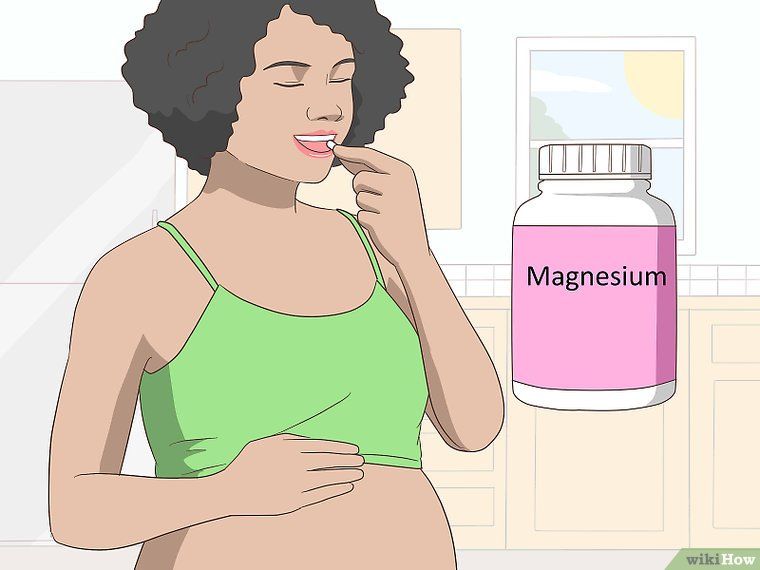 Violation of blood circulation, increased stress on the muscles - all this can cause night cramps.
Violation of blood circulation, increased stress on the muscles - all this can cause night cramps.
What should I do if my legs cramp during pregnancy?
To begin with, tell the doctor you are seeing about this. The magnesium preparations already mentioned, which he most likely recommends to you, can help solve the problem. nine0005
However, the reason that the expectant mother cramps her legs during pregnancy may be not only a metabolic disorder. Often muscle spasms begin as a result of varicose veins - the "faithful" companion of pregnancy. The veins of a woman carrying a baby are subject to increased stress. In addition, hormonal changes in the body seriously affect the state of blood vessels. All this contributes to the development of varicose veins. And a violation of the blood supply to the muscles of the legs, in turn, leads to convulsions.
If the expectant mother is faced with varicose veins, then the best prevention of its progression is to wear compression stockings selected by the doctor in accordance with the gestational age.